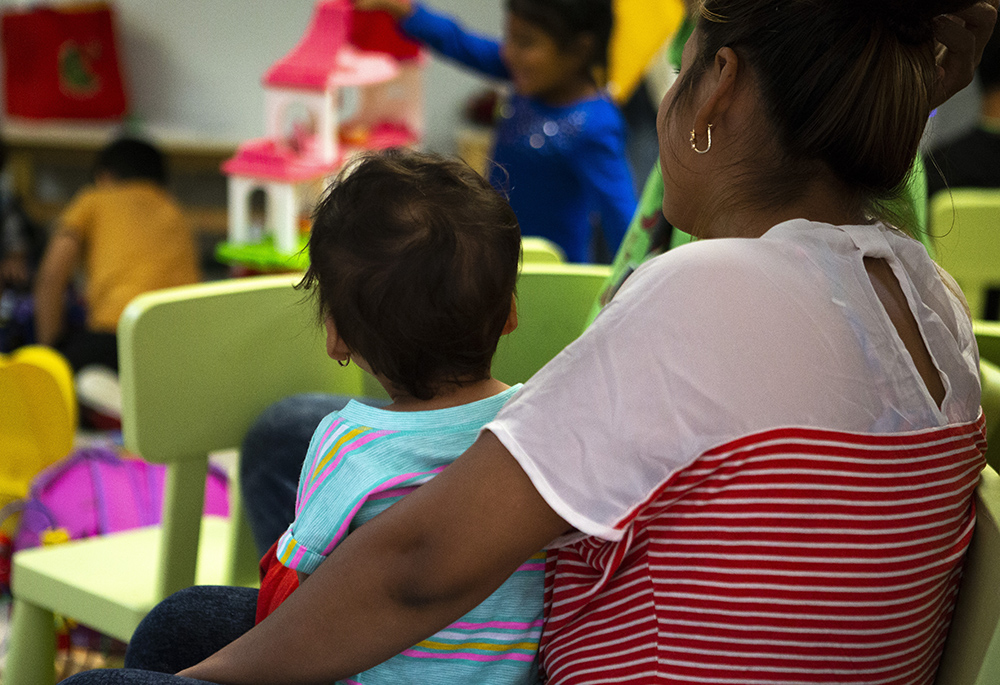
A Central American woman, who was recently released from U.S. custody, holds her child July 1, 2018, as they watch other immigrant children play at a Catholic Charities-run respite center in McAllen, Texas. (CNS/Chaz Muth)
Growing up on the southern border of the United States — surrounded by friends and family and fed by love and tamales — we celebrated Feb. 2, el Dia de la Candelaria (the feast of the Presentation, or Candlemas) to conclude a season meditating on the infancy of Jesus. From the first day of the season of Advent to Feb. 2, we focused on preparing the way and rejoicing in the birth of Christ.
During that season, I thought of how vulnerable baby Jesus is. As an infant, Jesus was persecuted, and with his parents had to migrate to another country because of violent threats to the peace of his family.
In my current ministry in admissions for Albertus Magnus College, I am fortunate to provide information to Spanish-speaking immigrant families about the education system in the United States. This opportunity allows me to learn the stories of hardworking families, to meet youth that have faced life-or-death situations, and to assist people that have risked everything they knew and loved for an opportunity to survive. The vulnerable child Jesus is palpable in this community. While the local parish and community is supportive, the vulnerable community faces uncertainty, the fear of deportation, and the reality of living as second-class citizens.
My heart breaks when I meet hardworking, studious, and focused children, who — even as they make every effort to build a better future, to earn an education and an opportunity to work with dignity — face defeat. Unfortunately, while the community and parish might have the best intentions to support our vulnerable immigrant children, the institutional structure to protect immigrants and grant a pathway to a dignified life in the United States is absent.
There are approximately 1 million undocumented children under the age of 18 living in the United States — children who, through no fault of their own, are automatically marginalized, discriminated against, and who daily fear deportation. In my ministry, I face the heartbreaking reality of children who seek peace, opportunity and support from their communities. Their uncertain immigration status is a black cloud over what could have been a bright future. For many of the high school students that I encounter, access to college is limited and they have few avenues for financial assistance.
The lack of response to the plight of undocumented minors is a failing that has plagued this country for many years. In 2012 the issue of a presidential executive action provided temporary protection from deportation and the opportunity to work legally. Deferred Action for Childhood Arrivals (or DACA) was intended to provide a temporary and humanitarian solution, granting children the opportunity to work for the American dream.
Introducing the rule, then-President Barack Obama stressed, "Now, let's be clear — this is not amnesty, this is not immunity. This is not a path to citizenship. It is not a permanent fix. This is a temporary stopgap measure that lets us focus our resources wisely while giving a degree of relief and hope to talented, driven, patriotic young people." This comment highlighted the need for Congress to act and create a bill that would take care of the undocumented youth.
Ten years later, Congress has yet to address this temporary program, now at risk for termination.
Since 2012, more than 800,000 people have benefited from the program. According to The Obama Foundation, more than 200,000 DACA program participants served on the frontline of the COVID-19 response during the last two years. DACA allows undocumented students to pursue an education, to work, and to contribute positively to their communities despite a very real fear of deportation. DACA was a temporary fix that empowered youth. DACA was a temporary fix that provided a dignified salary for those with a qualified education and skill set.
Advertisement
If DACA is ended, thousands will be without protection. We have a responsibility to the immigrant young people of our nation, and we must respond. We have the civic responsibility to demand accountability from Congress. We cannot keep waiting through 10 — 20 — or even more years of uncertainty. Congress has the power to provide our vulnerable immigrant children with permanent protections from deportation, the opportunity to pursue an education and to work in a dignified manner. It is up to us to speak on behalf of our neighbors, the Dreamers, and to demand laws that protect our undocumented migrant children.
Those who walk with and witness the challenges faced by immigrant children must speak on their behalf, encouraging legislative leaders to pass laws protecting them. We must demand a permanent solution guaranteeing lawful protection and a pathway to citizenship, so Dreamers and DACA recipients can remain in this nation and continue to contribute positively to our communities.
Time is of the essence. We must not forget our vulnerable immigrant children — we must accept our responsibility!
Perhaps, during the season of Lent, we can make our almsgiving — our gift — the personal task of writing to our legislative leaders to demand legislation that protects our Dreamers, and invite our friends, families, and communities to stand with the children.
We can reach out in various ways: leave a voicemail with the White House or write a message on their comment form. We can contact our representative and our senator, go to the offices of our members of Congress during their home visits, or write to them at their offices in Washington.
On Valentine's Day, let's not stop our prayers and actions for the immigrants and the children just as we put away our nativity set and bring it out again next year. Rather, let us put our prayer into action to protect those children. We can all do something to make a difference: reaching out to our elected leaders, volunteering at shelters, offering prayers, raising awareness and — most important — demanding action for our Dreamers, our vulnerable immigrant children.





